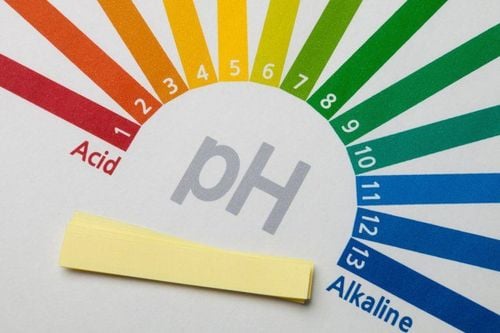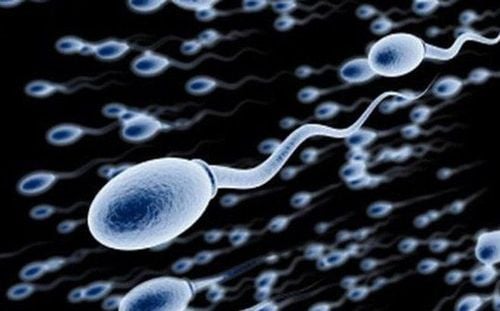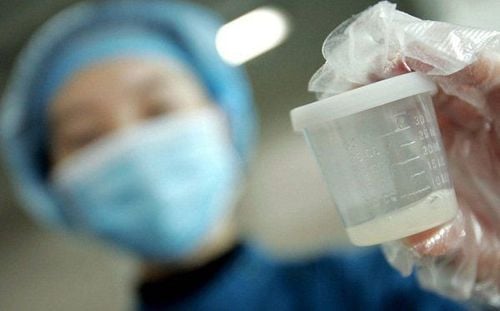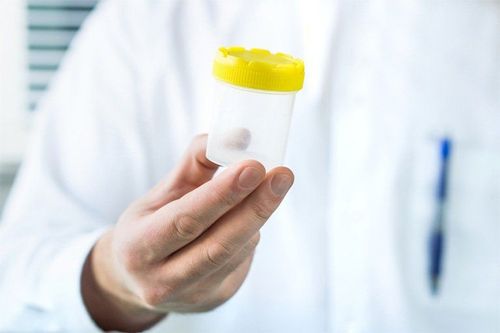The signs of sperm weakness are symptoms that must be recognized early and treated immediately. This condition directly affects reproductive ability and is also the leading cause of male infertility. The following article will provide detailed information on how to identify weak sperm as well as other essential information to effectively protect reproductive health.
The article is professionally consulted by Dr. Vo Thien Ngon (MSc, MD) - Department of General Surgery - Vinmec Da Nang International Hospital.
1. What is weak sperm?
Weak sperm refers to a condition in which the sperm are present in low quantity and quality and do not last long on the way to the egg for fertilization, making it difficult for a woman to conceive. Even with successful fertilization, the fetus may have difficulties in maintaining development, experience growth retardation, or have a high risk of congenital malformations. Men with this condition often feel insecure and inferior and can easily fall into a state of stress or a serious psychological crisis. This disease is often accompanied by erectile dysfunction in men.
2. What factors determine whether sperm are healthy or weak?
Sperm health depends on many factors such as quantity, motility, and structure of sperm:
- Quantity: An important factor in determining whether sperm are healthy or weak is the number of sperm in each ml of semen after ejaculation. For a high probability of conception, each ml of semen must contain at least 15 million sperm. A low sperm count can reduce the chance of conception because fewer sperm have the opportunity to reach and fertilize the egg.
- Motility: In order to reach and fertilize the egg, the sperm must move (swim through the woman's cervix, uterus, and fallopian tubes). This process is called sperm motility. When at least 40% of sperm are motile, the chance of conception increases significantly.
- Morphology: Sperm morphology also contributes to the likelihood of conception. Healthy sperm usually have an oval head and a long tail, which helps them move effectively. Although not as important as quantity and motility, sperm with normal morphology increases the likelihood of conception.
3. Signs of Weak Sperm
The health of sperm, whether strong or weak, cannot be accurately assessed through observation alone. The most apparent sign of weak sperm is infertility. Infertility is defined as the inability to conceive after one year of regular sexual intercourse without using contraception. The cause of infertility may lie with the male, the female, or both. To determine sperm quality, a semen analysis test is necessary.
Some signs of weak sperm include:
- Thin semen, low quantity: The semen does not have the characteristic stickiness and viscosity but is thin like rice water, which is a sign of an abnormal decline in sperm quantity and quality, affecting fertility.
- Lumpy semen: In this condition, the semen contains small white particles like grains of rice and feels smooth like powder when squeezed. This can make it difficult for the sperm to move to fertilize the egg and can cause it to die easily. This is a sign of weak sperm that men can easily notice with the naked eye.
- Thick semen: At a temperature of 37°C, the semen changes from a thick to a liquid state in less than 60 minutes. If the semen does not liquefy or only partially liquefies, this is a sign of coagulation, making it difficult for the sperm to move to the egg.
- Abnormal semen color: The color of semen is also an essential indicator of reproductive health. Abnormal semen color is a sign of weak sperm. Men need to see a specialist soon to find out the cause and get timely treatment.
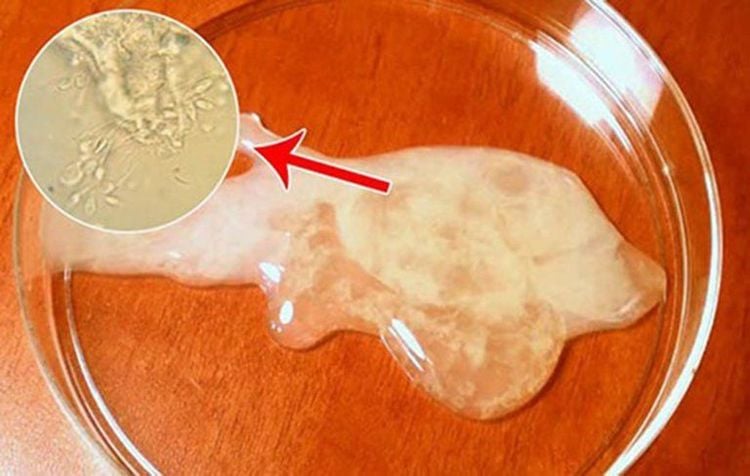
4. Factors contributing to reduced sperm quality
The process of sperm production is complex and requires the normal functioning of related organs such as the testicles, hypothalamus, and pituitary gland. Any disorder in this process can impact sperm production. Below are some common causes leading to the manifestation of reduced sperm quality:
4.1. Pathological causes
Some diseases and treatments can lead to poor sperm quality, including:
- Varicocele (an abnormal enlargement of the veins in the scrotum): This is a common cause of poor sperm quality, leading to infertility in men. This condition can be treated, but the exact cause of varicocele is still unclear.
- Infection: An infection can negatively affect the production process and cause damage or scarring that blocks the path of sperm. Examples include epididymitis (an inflammation of the tube at the back of the testicle), orchitis (inflammation of one or both testicles), and some sexually transmitted diseases such as gonorrhea (a sexually transmitted infection caused by the bacterium neisseria gonorrhea) and HIV.
- Autoimmune diseases: Although rare, there are cases in which antibodies in the body attack and destroy sperm, resulting in weak sperm.
- Tumors: Tumors can cause hormonal imbalances, affecting the reproductive organs. Additionally, tumor treatments can also impact male fertility.
- Hormonal imbalance: Hormones play a crucial role in sperm production. An imbalance in these hormones can reduce male fertility.
- Certain medications: Some medications can directly affect sperm cell production, leading to reduced fertility in men.
- Other causes: genetic disorders or congenital defects can also impact male fertility.
4.2. Environmental causes
The process of sperm cell production and sperm function can be affected by excessive exposure to environmental factors, such as:
- Industrial chemicals: Prolonged exposure to substances like benzene, toluene, xylene, pesticides, herbicides, organic solvents, and paint materials can severely damage sperm.
- Heavy metals: Exposure to lead and other heavy metals can be a cause of infertility.
- Radiation: Radiation exposure can impair or completely eliminate a person's ability to produce sperm. Recovery of sperm production after radiation exposure can take several years.
4.3. Lifestyle and other causes
Lifestyle can greatly affect sperm quality and production, leading to weak sperm:
- Alcohol consumption: Alcohol and alcoholic drinks can lower testosterone levels and negatively impact sperm health.
- Smoking: Cigarettes are not only harmful to health in general but also directly affect men's reproductive health.
- Stress, depression: These conditions can negatively affect sperm production.
- Weight: Obesity not only directly affects sperm quality but also causes hormonal imbalance, thereby affecting sperm production.

5. How to prevent weak sperm
In addition to recognizing the signs of weak sperm, preventing weak sperm is equally important. Although there are no definitive measures to completely prevent weak sperm, there are several methods that may limit this condition:
- Maintain a reasonable weight: Research has shown that a high body mass index (BMI) may be associated with a decrease in sperm quality and mobility.
- Healthy diet: Including plenty of green vegetables and fruits rich in antioxidants in your daily diet can improve sperm health.
- Protect against sexually transmitted infections (STIs): Infections such as chlamydia and gonorrhea can contribute to male infertility. Using condoms during sexual activity or engaging in a monogamous relationship with an uninfected partner can help reduce the risk of STIs.
- Avoid stress: Stress can reduce sexual performance and affect hormones involved in sperm production.
- Active lifestyle: Moderate exercise can enhance the activity of antioxidant enzymes, helping to protect sperm.
- Quit smoking: Smoking negatively affects many aspects of health, including reproductive health. If you're having trouble quitting smoking, get help from a doctor.
- Limit alcohol consumption: Alcohol and alcoholic beverages reduce testosterone levels and affect sperm. Alcohol consumption should be limited to moderate amounts.
- Be careful with toxins: Exposure to harmful substances like pesticides, lead, and other toxins can reduce sperm quantity and quality. If exposure is unavoidable, use proper protective equipment and avoid direct skin contact with chemicals.
- Wear loose clothing: Increased temperature in the scrotal area can affect sperm production. Avoid activities like wearing tight clothes, sitting for prolonged periods, using saunas, taking hot baths, or placing a laptop on your lap. These practices can help improve sperm quality.
To examine and treat weak sperm conditions, patients can visit the Urology Department at Vinmec International Hospital.
The Urology Department is responsible for helping patients with diagnosis, treatment, and early detection of weak sperm, as well as other health issues related to male reproductive organs, sexual dysfunction, reproductive function, and sexually transmitted diseases.
Common conditions treated at the department include seminal vesicle inflammation, orchitis (inflammation of the testicles), balanitis (inflammation of the foreskin), bladder inflammation, urethritis, phimosis (tight foreskin), and other related disorders.
Dr. Vo Thien Ngon has over 7 years of experience in urology and surgical treatment, having worked at hospitals such as the Hue Central Hospital, Hue University of Medicine and Pharmacy Hospital, and Tam Tri Da Nang General Hospital.
Dr. Ngon specializes in the diagnosis and treatment of urological and andrological conditions, urological surgeries, endoscopic urological surgeries, laparoscopic urology, and surgeries for andrological diseases.
Currently, Dr. Vo Thien Ngon is a urological and andrological surgeon at the General Surgery Department, Vinmec Da Nang International Hospital.
To arrange an appointment, please call HOTLINE or make your reservation directly HERE. You may also download the MyVinmec app to schedule appointments faster and manage your reservations more conveniently.
Article referenced source: Mayoclinic.org







